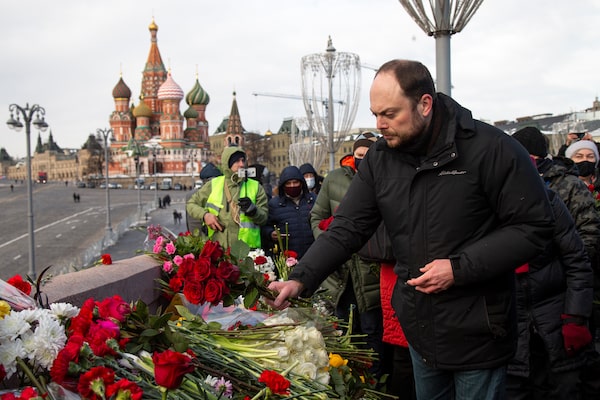
Vladimir Kara-Murza, Russian opposition activist lays flowers near the place where Russian opposition leader Boris Nemtsov was gunned down, in Moscow, Russia, Feb. 27, 2021.Alexander Zemlianichenko/The Canadian Press
The wife of Russian human-rights activist Vladimir Kara-Murza, who was jailed this month after a CNN interview in which he condemned Moscow’s war on Ukraine, is urging Canada and other Western countries to press the Kremlin to release him and other prisoners of conscience.
Former Liberal justice minister Irwin Cotler echoed this call, saying he fears Russia is trying to silence a man who has “emerged as the leading advocate for democracy and human rights in Russia and a leading critic of Moscow’s external aggression.”
Mr. Kara-Murza, 40, was arrested April 11 in Moscow after the broadcast of an interview in which he called Russian President Vladimir Putin’s government a “regime of murderers.” He was immediately charged with disobeying police and sentenced to 15 days in prison.
A former deputy leader of the People’s Freedom Party, he currently lives in the United States but makes frequent trips to Russia, most recently in early April.
“He believed he needed to be there to show people they should not be afraid to stand up to Putin and his regime,” his wife, Evgenia Kara-Murza, said in an interview.
She acknowledged this sounded idealistic. “But honestly, first of all, it’s true,” Ms. Kara-Murza said. “You cannot bring change by keeping silent and today is definitely not the day to keep silent.”
Russia deepened its crackdown on free speech after its full-scale military assault on Ukraine that began Feb. 24. In early March, the Russian parliament passed a law that makes the spread of so-called fake information about the military an offence punishable with fines or jail terms of up to 15 years.
Russians have been detained for seemingly innocuous protests including holding a blank sign or a copy of Tolstoy’s War and Peace. OVD-Info, a Russian human-rights group tracking arrests of those protesting the war, recorded more than 15,000 detentions in 151 Russia cities as of late March.
“In the space of two months, we went from an authoritarian state to a totalitarian state,” Ms. Kara-Murza said, speaking from North Virginia where she lives with her husband and their three children.
She said the charge against him is bogus. Police alleged her husband was trying to evade them on foot but in fact they surrounded him in his parked car. She said she fears this conviction was a pretext to hold Mr. Kara-Murza until the state fashions more serious charges against him. His good friend, former Russian deputy prime minister Boris Nemtsov, a harsh critic of Moscow’s 2014 invasion of Ukraine and annexation of Crimea, was murdered in 2015.
“Vladimir is just one of many prisoners of conscience serving unlawful sentences across Russia,” Ms. Kara-Murza said.
Late last year before it was shut down by Russian authorities, Memorial, one of the country’s oldest human-rights groups, estimated there were now 420 political prisoners in the country – a figure it said recalled Soviet-era levels of repression.
Ms. Kara-Murza urged Westerners not to trust polls in Russia that show Mr. Putin’s approval rating has risen since the military assault on Ukraine began. State-run pollster VTsIOM last week said the proportion of Russians who trust Mr. Putin has risen to 81.6 per cent from 67.2 per cent before.
Her husband helped lead the campaign to press Western governments, such as in Canada, the U.S., the European Union and Australia, to adopt laws that enable sanctions against foreigners who have committed human-rights abuses or corruption. What’s been called Magnitsky legislation is named after a whistle-blower who died in jail after accusing Russian government officials of fraud.
Mr. Kara-Murza twice suffered from serious poisonings – in 2015 and in 2017 – that he blamed on the Kremlin. “He had to relearn how to walk and hold a spoon after both his poisonings,” his wife said. “But the moment he was stable on his feet, he would take his cane and head back to Russia.”
He has ties to Canada. He is a senior fellow at the Raoul Wallenberg Centre for Human Rights in Montreal. As well, his brother lives in Canada.
Bill Browder, the U.S.-born financier and central player in the international effort to establish Magnitsky legislation, said Wednesday: “Until Vladimir is released, his case should be at the top of the agenda of Western governments. He’s one of the few Russian leaders who is brave enough to be speaking out against Putin and the war and he should be supported in every way possible.”
Prime Minister Justin Trudeau has rejected calls to withdraw Canada’s ambassador in Moscow and shutter the embassy, arguing the dozens of Canadian diplomats posted there are needed to keep open channels of communication between the two countries.
Foreign Affairs Minister Mélanie Joly’s office, when asked if the government would press the Kremlin to release Mr. Kara-Murza, said it’s working with international partners and organizations to “apply pressure to Russia.”
Press secretary Adrien Blanchard added: “We urge Russian authorities to immediately release all those detained for exercising their rights to freedom of speech and of assembly.” He also pointed to a tweet by Ms. Joly calling for Mr. Kara-Murza’s release.
With reports from Reuters and Associated Press
Our Morning Update and Evening Update newsletters are written by Globe editors, giving you a concise summary of the day’s most important headlines. Sign up today.
 Steven Chase
Steven Chase